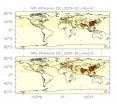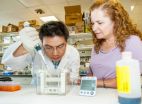(Press-News.org) Scientists are reporting development of a new transparent solar cell, an advance toward giving windows in homes and other buildings the ability to generate electricity while still allowing people to see outside. Their report appears in the journal ACS Nano.
Yang Yang, Rui Zhu, Paul S. Weiss and colleagues explain that there has been intense world-wide interest in so-called polymer solar cells (PSCs), which are made from plastic-like materials. PSCs are lightweight and flexible and can be produced in high volume at low cost. That interest extends to producing transparent PSCs. However, previous versions of transparent PSCs have had many disadvantages, which the team set out to correct.
They describe a new kind of PSC that produces energy by absorbing mainly infrared light, not visible light, making the cells 66 percent transparent to the human eye. They made the device from a photoactive plastic that converts infrared light into an electrical current. Another breakthrough is the transparent conductor made of a mixture of silver nanowire and titanium dioxide nanoparticles, which was able to replace the opaque metal electrode used in the past. This composite electrode also allowed the solar cell to be fabricated economically by solution processing. The authors suggest the panels could be used in smart windows or portable electronics.
###The authors acknowledge funding from the Engineering School of UCLA, the Office of Naval Research and the Kavli Foundation.
The American Chemical Society is a nonprofit organization chartered by the U.S. Congress. With more than 164,000 members, ACS is the world's largest scientific society and a global leader in providing access to chemistry-related research through its multiple databases, peer-reviewed journals and scientific conferences. Its main offices are in Washington, D.C., and Columbus, Ohio.
To automatically receive news releases from the American Chemical Society, contact newsroom@acs.org.
Transparent solar cells for windows that generate electricity
2012-08-01
ELSE PRESS RELEASES FROM THIS DATE:
Artificial butter flavoring ingredient linked to key Alzheimer's disease process
2012-08-01
A new study raises concern about chronic exposure of workers in industry to a food flavoring ingredient used to produce the distinctive buttery flavor and aroma of microwave popcorn, margarines, snack foods, candy, baked goods, pet foods and other products. It found evidence that the ingredient, diacetyl (DA), intensifies the damaging effects of an abnormal brain protein linked to Alzheimer's disease. The study appears in ACS' journal Chemical Research in Toxicology.
Robert Vince and colleagues Swati More and Ashish Vartak explain that DA has been the focus of much research ...
Discovering new uses for old drugs
2012-08-01
With the cost of putting a single new drug on the pharmacy shelves topping a staggering $1 billion, scientists are reporting development of a way to determine if an already-approved drug might be used to treat a different disease. The technique for repurposing existing medicines could cut drug development costs and make new medicine available to patients faster, they report in ACS' Journal of Medicinal Chemistry.
Sivanesan Dakshanamurthy and colleagues explain that drug companies must limit efforts to market new drugs because the current approach is so expensive, time-consuming ...
Worldwide increase of air pollution
2012-08-01
This press release is available in German.
Hot summer days cause in large cities very seldom great happiness among inhabitants. On those days the air is highly polluted with automobile and industrial emissions what makes breathing difficult and unhealthy. According to the latest calculations of Max Planck scientist Andrea Pozzer this scenario could become true for most of world population in 2050 if no counteractive measures are taken. Especially China, North India and the Middle East are expected to be affected by a drastic decrease in air quality.
In 2050, the ...
Spouses of breast cancer survivors hold on to hope
2012-08-01
(Edmonton) Male partners of breast cancer patients are likely to take a pass on spousal support groups in favour of exercise or an evening out with friends to cope with stresses associated with the disease, according to new research from the University of Alberta.
Faculty of Nursing professor Wendy Duggleby said spouses of women with breast cancer have unique needs when it comes to retaining a sense of hope at a time when they provide important physical and emotional support for their partners.
"There are many programs out there for women, but for men a lot of support ...
Black gay men worldwide 15 times more likely to have HIV and racial disparity
2012-08-01
ATLANTA – An international team of researchers, including a scientist at Georgia State University, found that black men who have sex with men (MSM) are more likely to have HIV than other MSM, and that social inequalities play a major role.
Examining data from nearly 200 studies in the U.S., the United Kingdom and Canada, the researchers found that stigma, poverty and inadequate access to health care were major factors in the disparities. The term "MSM" was used in the study, as some men who have sex with men do not identify with the terms gay or bisexual.
The results ...
Research: Men respond negatively to depictions of 'ideal masculinity' in ads
2012-08-01
CHAMPAIGN, Ill. – The male response to depictions of ideal masculinity in advertising is typically negative, which has implications for advertisers and marketers targeting the increasingly fragmented consumer demographic, according to research from a University of Illinois marketing expert.
Cele Otnes, a professor of advertising and of business administration who studies how marketing and advertising shapes consumption, says that men who compare themselves to the hyper-masculine or over-exaggerated male stereotypes in advertising and popular culture experience a range ...
New research reveals extent of poor-quality antimalarial medicines in South American countries
2012-08-01
Rockville, Md., August 1, 2012 — Two articles recently published in Malaria Journal shed new light on the quality of antimalarial medicines circulating in countries in the Amazon Basin in South America. Researchers from the Promoting the Quality of Medicines (PQM) program, a cooperative agreement between the U.S. Agency for International Development (USAID) and the U.S. Pharmacopeial Convention (USP), in conjunction with country partners, coordinated these studies in the context of the Amazon Malaria Initiative (AMI).
"Though several studies in recent years have assessed ...
Obese donors increase risk of death for pediatric liver transplant recipients
2012-08-01
Children undergoing liver transplantation are at greater risk of graft loss and death from adult organ donors who are severely obese according to research published in the August issue of Liver Transplantation, a journal of the American Association for the Study of Liver Diseases. The study, funded in part by a grant from the National Institutes of Health (NIH), found that pediatric donor body mass index (BMI) did not increase mortality risk in this pediatric population.
Obesity is a global health concern. A 2008 report from the World Health Organization (WHO) estimates ...
13-year Cascadia study complete – and Northwest earthquake risk looms large
2012-08-01
CORVALLIS, Ore. – A comprehensive analysis of the Cascadia Subduction Zone off the Pacific Northwest coast confirms that the region has had numerous earthquakes over the past 10,000 years, and suggests that the southern Oregon coast may be most vulnerable based on recurrence frequency.
Written by researchers at Oregon State University, and published online by the U.S. Geological Survey, the study concludes that there is a 40 percent chance of a major earthquake in the Coos Bay, Ore., region during the next 50 years. And that earthquake could approach the intensity of ...
Researchers find potential cancer roadblock
2012-08-01
EAST LANSING, Mich. — By identifying a key protein that tells certain breast cancer cells when and how to move, researchers at Michigan State University hope to better understand the process by which breast cancer spreads, or metastasizes.
When breast cancer metastasizes, cancer cells break away from a primary tumor and move to other organs in the body, including the lungs, liver and brain. In work published recently in the journal Cancer Research, MSU researchers Kathy Gallo and Jian Chen show a protein called MLK3 (mixed lineage kinase 3) is a critical driver of breast ...


